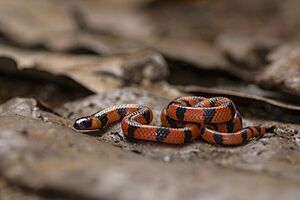Bibron's coral snake facts for kids
Quick facts for kids Calliophis bibroni |
|
|---|---|
 |
|
| Conservation status | |
| Scientific classification | |
| Genus: |
Calliophis
|
| Species: |
bibroni
|
| Synonyms | |
|
|
Calliophis bibroni, also known as Bibron's coral snake, is a type of venomous snake. It belongs to the family called Elapidae. This snake is found only in India.
Contents
What's in a Name?
The snake's scientific name, bibroni, honors a French zoologist and herpetologist named Gabriel Bibron. He lived from 1806 to 1848.
Where Does It Live?
Bibron's coral snake lives only in the Western Ghats region of India. This area includes parts of Karnataka state, Kerala state, and northwestern Tamil Nadu state.
Snake Homes
This snake prefers to live in wet forests. It can be found at different heights, from sea level up to about 1,220 meters (4,000 feet) high.
What Does It Look Like?
Bibron's coral snake has small eyes. Its eyes are about half the distance from its mouth. The top of its head has special scales.
Scales and Color
The scales on its back are smooth. They are arranged in 13 rows around the middle of its body. The scales on its belly are called ventral scales. There are usually between 222 and 226 of these. The scales under its tail are divided into pairs.
The snake's body can be cherry-red or dark purplish-brown on top. Its belly is red. It also has black bands that sometimes go all the way across its belly. The front part of its head is black.
Size of the Snake
Adult Bibron's coral snakes can grow up to 64 centimeters (25 inches) long. This includes its tail, which is about 5 centimeters (2 inches) long.
What Does It Eat?
Bibron's coral snake is a special kind of hunter. It mainly eats other snakes! It especially likes to eat snakes from the family called Uropeltidae. This means it is an ophiophagous snake.
How Does It Reproduce?
Bibron's coral snake lays eggs. This means it is oviparous.


